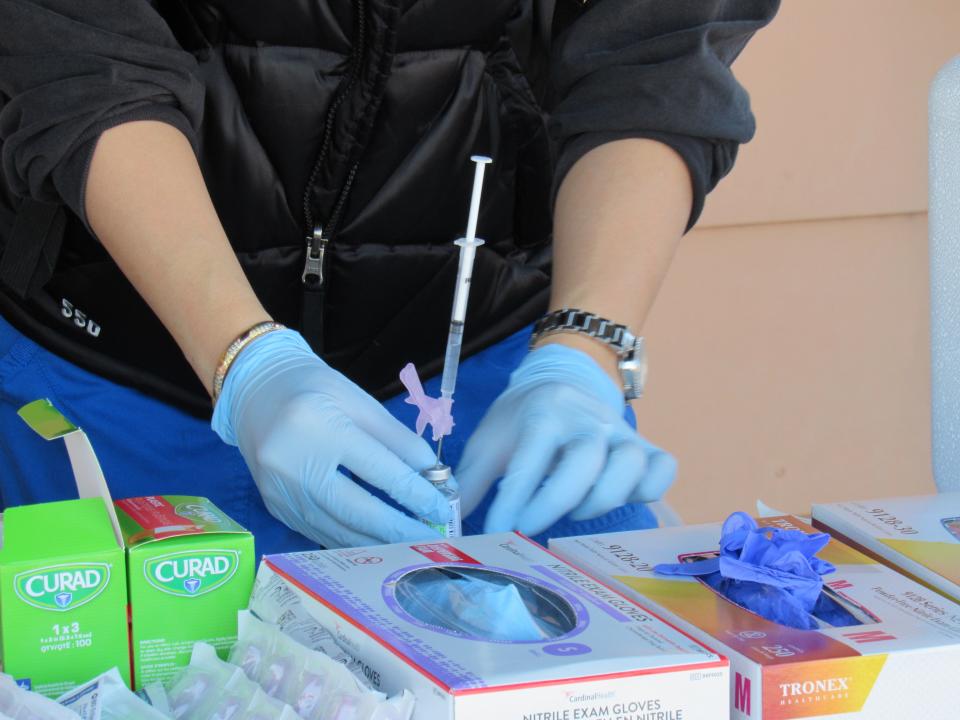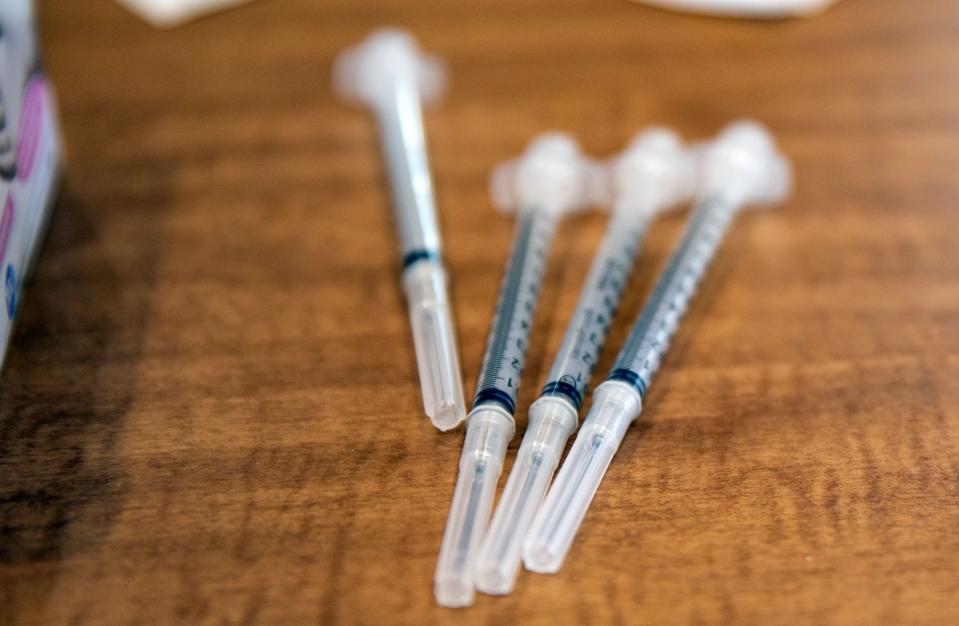Des Moines area hospitals bracing for another influx in 'tripledemic' respiratory illnesses
- Oops!Something went wrong.Please try again later.
Though some local experts say Iowa is likely past the worst of it, Des Moines metro hospitals are still anticipating another rise in seasonal illnesses in the coming weeks.
Beginning in November, hospitals in Iowa and across the country were in the throes of what some described as the worst winter for respiratory viruses in recent memory.
Local health care providers were struggling with extraordinarily high infection rates of respiratory syncytial virus (RSV) along with the ongoing burden of other seasonal viruses, including COVID-19 and influenza.
This collision of multiple viruses at once — dubbed the "tripledemic" — overcrowded clinics and emergency rooms, creating long wait times and pushed hospitals to the brink.
Case counts in the metro eased in the weeks heading into the end-of-year holidays. However, influenza infections are continuing to rise, and a new highly contagious coronavirus variant is poised to cause a surge in new infections in the coming weeks. With Iowans returning from indoor holiday celebrations and returning to school or work, local health care providers say they expect another increase in viral activity.
"We could be pleasantly surprised, but I don't think so. I think we will see a bump in illnesses," said Dr. Patricia Newland, a family medicine provider and the CEO of UnityPoint Clinic.
More:XBB.1.5, the latest COVID-19 variant, will probably infect everyone. What you should know.
Even as providers prepare for this new viral wave, preliminary data on the latest coronavirus variant, XBB.1.5., offers a silver lining. Dr. Aneesa Afroze, an infectious disease specialist at MercyOne Medical Center in Des Moines, said this surge in new illnesses may not necessarily lead to overwhelming patient volumes in local hospitals and clinics.
"Transmission and cases in the community might be up, but in terms of hospitalizations at least, health care facilities won't face those surges we had in the past," she said. "If we can control influenza a little bit more, I think we are good."
RSV has declined, but other viruses expected to progress
Rates of RSV, which causes serious illness in young children and elderly adults, have dropped significantly since November.
At its peak, nearly 20,000 new cases were diagnosed nationwide in one week in November, according to the U.S. Centers for Disease Control and Prevention. As of Dec. 31, federal health officials reported nearly 1,700 new infections.

In Iowa, nearly 250 new cases of RSV were reported the week ending Dec. 31, public health data shows. That compares with the nearly 1,400 cases reported statewide in the week ending Nov. 26.
Influenza activity in Iowa is high, with hundreds testing positive for the virus as of the last week in December, the most recent data available from state public health officials. To date, 56 Iowans have died and 290 individuals have been hospitalized as a result of the flu.
The latest version of the coronavirus, which has already swept through other parts of the U.S., is also expected to hit Iowa in earnest in the coming weeks.
"We've all been through some of this before, but COVID has thrown a different curveball," Newland said. "To this point, COVID has not been seasonal like many of our other viruses, so it just does add another layer of complexity and illness burden that can make all of our clinics and urgent cares and hospitals and long-term care facilities much busier."
Experts say the omicron offshoot XBB.1.5. is five times more contagious than its earlier omicron version, which was already five times more infectious than the original strain of the virus. Most Americans should expect to be infected, even those who have so far avoided COVID-19, according to public health experts.
This latest version of the coronavirus doesn't appear to cause more severe illnesses. However, at-risk populations, such as individuals who are immunocompromised, continue to face elevated risk.
"If people are at higher risk for illnesses, they may need to make different decisions about what they do and don't do during this time," Newland said.
Local hospitals aren't implementing any additional steps at this time, but Newland said officials will continue to monitor cases to determine whether any strategies need to be employed to prevent clinics and inpatient settings from being overwhelmed.
Last month, UnityPoint Health implemented new scheduling processes for its urgent care clinics to control the flow of patients. Appointments are still recommended at UnityPoint Health clinics to help patients avoid long wait times, Newland said.
MercyOne converted two urgent care clinics in Ankeny and Des Moines to virtual-only visits last month, a measure that remains in effect.
How to stay healthy
Vaccines against influenza and COVID-19 continue to be the best way to prevent severe illnesses and hospitalization, Afroze said.
"We still keep pushing for vaccinations and we have been pushing since the COVID vaccine came out, but the overall rate of bivalent boosters and influenza shots have remained low," she said.

The bivalent coronavirus booster dose is designed to offer protection against omicron strains of the virus, as well as the original strain of the virus. However, most recent data from the state public health department shows fewer than 1 in 6 Iowans has received that shot, prompting state and local public health officials to renew their emphasis on those vaccines.
As of last week, only 34% of the state population had received a flu vaccine.
Afroze said Iowans should also check themselves with an at-home COVID-19 test early and often if they ever begin experiencing symptoms of a respiratory infection. Individuals should also stay home while they are feeling sick, and should keep children from school or day care if they are infected.
Providers also continue to tout the same public health measures experts have recommended since the beginning of the pandemic, which include frequent hand washing and wearing a mask in crowded, indoor spaces.
Michaela Ramm covers health care for the Des Moines Register. She can be reached at mramm@registermedia.com, at (319) 339-7354 or on Twitter at @Michaela_Ramm.
This article originally appeared on Des Moines Register: Iowa hospitals expect rise in illnesses, but not in hospitalizations

